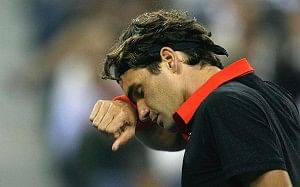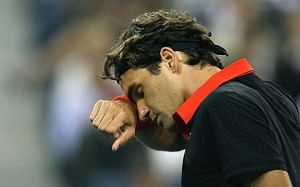
Roger Federer: Decline or Denial?
If you’re wondering whether we’ve turned back the clock to 2008, when talking and writing about Roger Federer’s ‘decline’ was as fashionable as spiked hair, then you can breathe easy. This is not one of those knee-jerk, ‘Roger Federer lost a match! Is the world coming to an end?’ pieces that sprang up in every corner when Federer stumbled from one uncharacteristic loss to another back in the days of mono and French Open drubbings. Two years have passed since those dark days, which puts us in a much better position to understand Federer’s game and his losses. Predictably, there has been no shortage of doomsday predictions with Federer’s latest loss to Novak Djokovic in the US Open semifinals, but there are many who are also willing to give Federer a pass on the basis of the common understanding that Djokovic was simply too good, too redlined for Federer to have done much better than lose honorably in a tough 5-setter. Don’t get me wrong; I think it’s pleasantly surprising to see that for once, people are focusing on the winner rather than looking for ways to kick the champion who lost. But as far as analyzing Federer’s performance is concerned, I think the experts are as much in denial about the signs as Federer seemed after his Wimbledon loss to Tomas Berdych.
The Federer-Djokovic (which Djkokovic won 5-7, 6-1, 5-7, 6-2, 7-5) match was not the best match of the year, as is being widely proclaimed. Far from it. The best match of any year does not feature 66 unforced errors from one player, nor can it be permissible for that player to have a first serve percentage that hovered below the 50% mark for most of the match. The quality of play did touch dizzying heights in the fifth set, but it cannot be denied that the rash of forehand errors by Federer towards the end of the set spoiled things a little. Credit Federer for refusing to cave in right till the bitter end, but remember that he had no business being in that situation in the first place. Did he fall asleep in those 6-1 and 6-2 sets? Throughout the match Federer’s footwork seemed a little off; he was late in reaching many of those wide forehands, thus getting robbed of what many consider his greatest strength – his ability to turn defense into offense. His return of serve was nowhere near as precise or consistent as it used to be in his halcyon days (and that has been the case for the greater part of the last 2 years), and even his volleys lacked their trademark sharpness. Was this just Djokovic redlining his game and taking it to Federer? Did I see a different match than everyone else?

Federer is 29 years old now, and if his body hadn’t started showing signs of slowing down by this time, then scientists would probably have had to conduct experiments on him to find out the source of his eternal youthfulness. Many of the errors that he makes these days are either due to inappropriate footwork or bad timing. As for his mental focus and consistency, do we even need to go there? His ‘ second set walkabouts’ and mid-match ‘visits to Mirkaland’ have become almost as legendary as his flying forehand. He simply cannot keep his foot on the pedal for a reasonable length of time any longer, which results in wild fluctuations in the quality of his play within a match, within a set, within a game and sometimes even within a point. Slowed reactions, inconsistent groundstrokes, lack of focus – if you’re telling me that advancing age has nothing to do with these symptoms then I think you’re consulting the wrong doctor.
You may have heard the line ‘The rest of the field has caught up to Federer’ a fair few times over the last year. But in my opinion it would be more pertinent to say that age has caught up to Federer. And I defy anyone who thinks that that is some kind of horrible tragedy. Federer is not super-human; he ‘can’t turn back the clock’, as he so poignantly said after his loss to Djokovic (although he may have been referring to the errors he made during the match, and not to his indifferent recent results in general). Federer doesn’t have to keep producing magical performances in every big match; he shouldn’t have to lift himself up after every demoralizing loss and come back bigger, better and faster (the way someone like Rafael Nadal, in his peak years as a tennis player, can). After his loss to Berdych at Wimbledon, Federer blamed an all-encompassing litany of reasons for his loss, ranging from injuries and lack of adequate preparation to, shockingly, bad luck. At that time he seemed like a man in denial, a man who simply could not see what nature had been trying to tell him. I think the time has come for him, and for the rest of the world, to embrace the fact that every great champion must necessarily go through a period of irreversible decline. Just the way you can’t cheat death, you can’t cheat age either.
In all the hullabaloo surrounding the unique dynamic of the Federer-Nadal rivalry and Federer’s surprising struggles in the matchup, people often forget that Nadal is not even a true rival of Federer. He is 5 years younger than the Swiss, while Djokovic and Andy Murray, Federer’s other main challengers these days, are 6 years to the good. And yet, Federer has been going around competing (and in the case of Murray and Djokovic, mostly winning) against these younger, fresher players, trying to prove to the world that he isn’t just another champion who beat up on the players of his own generation (as if that was a bad thing by any stretch of the imagination). Federer has paid his dues, and then some. So why should it be so hard to accept that the inevitable ride into the sunset for this great master may not be as smooth or as delayed as his freak talent seemed to suggest?
If Federer doesn’t play another tennis match in his life, he’ll still be counted among the 3 best players to have ever lifted a racquet. Heck, he could have retired after the French Open last year and he would have been assured of his place on the very top tier of tennis greats. Which is why his late career struggles should be seen for what they are – evidence of the miles he put in over a long, dazzling career, a career that was more arduously earned than may seem from the effortless way he plays. From this moment on he probably won’t reach the semifinals or better of every Grand Slam he enters the way he did from mid-2004 to mid-2009. He won’t keep relentlessly adding to his tally of Major titles like a man possessed. He won’t keep turning his opponents into bewildered masses of misery through his sheer genius. And all of that is ok, because Federer has the right to grow old just like you and me and the rest of the world.